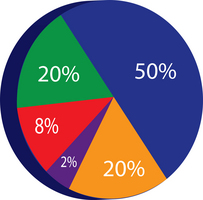Establish An Investing Discipline When You Are In College
 Going to college and establishing what you want to pursue in the future is a great time in your life. The academic and social experiences during the college years are often unlike any others. But even though it seems like the last thing on a student’s mind, making the right financial and savings decisions while in college now can impact on their adult life in a very positive way.
Going to college and establishing what you want to pursue in the future is a great time in your life. The academic and social experiences during the college years are often unlike any others. But even though it seems like the last thing on a student’s mind, making the right financial and savings decisions while in college now can impact on their adult life in a very positive way.
The investing discipline I’m describing here (although using traditional bank accounts) is what you need to start doing with stocks, mutual funds and other investments once you begin your working career. Learning this in college will help you secure your future.
Once you graduate and transition into a working adult life, there are expenses that would be better paid for by money you saved during college, rather than charging those expenses on a credit card and beginning adult life with a large amount of high-interest debt. Plus, starting the habit of saving now makes it easier to continue saving once you’re working full time.
Most college students are strapped for cash, though, so it might seem like there aren’t really any opportunities to become a saver. Fortunately, even saving a small amount each week or each month, and making this a priority in your budget, can really add up. If you save just $10 a week during your four year stay in college, you’d have well over $2,000 by the time you graduate. And if you get a summer job each year and save a good portion of each of those paychecks, you’ll be able to save much more.
Sometimes, of course, there will be unexpected expenses that pop up during the school year. For this reason, it’s probably best to keep a significant portion of your savings in a savings or checking account. This way you’ll be able to access your money at any time. Many local banks and credit unions in college towns offer low-fee or no-fee accounts to students, so this makes the process even easier. Many of these banks also offer “money market” accounts for relatively low balances, and these accounts can really boost how much your savings earn.
Of course, once you’ve saved $500 or $1,000 there might be a temptation to go on a shopping spree or spend it all on a spring break vacation. Instead, once you get to this savings milestone, consider putting this money into a Certificate of Deposit (or “CD”) at your bank. A CD is a separate account with a commitment that you’ll keep your money in that account for a certain amount of time – usually ranging from three or six months up to five years.
In exchange for that time commitment, you’ll receive a higher rate of interest than you would for a traditional savings or money market account. If you have a genuine emergency and need your money before the CD time period ends you can always withdraw your money, although you’ll generally have to forfeit a portion of the interest. This makes it less likely that you’ll withdraw your money to use for impulse purchases and expenses.
By beginning these savings habits while you’re still in college and don’t have much income, it’ll be much easier to continue the habit once you’ve graduated and have a full-time income.



